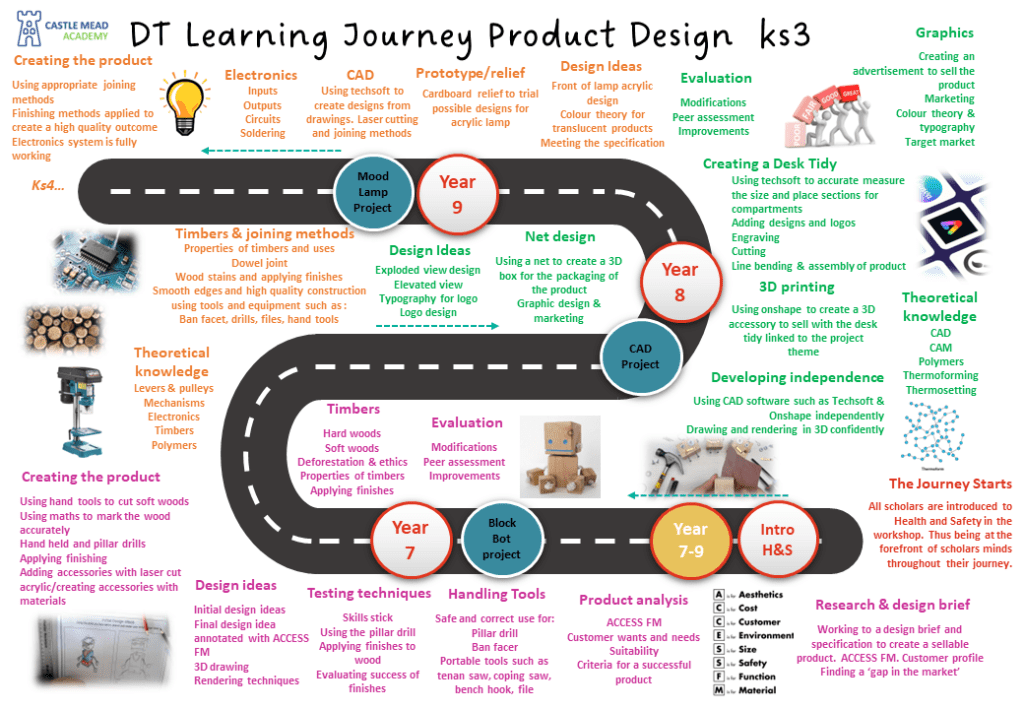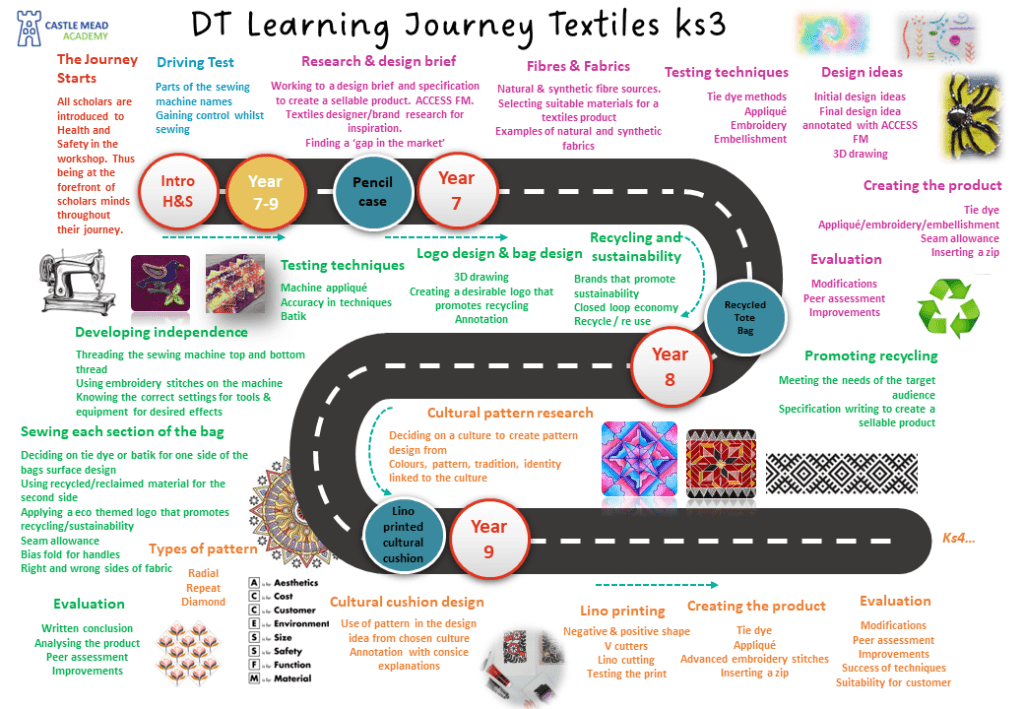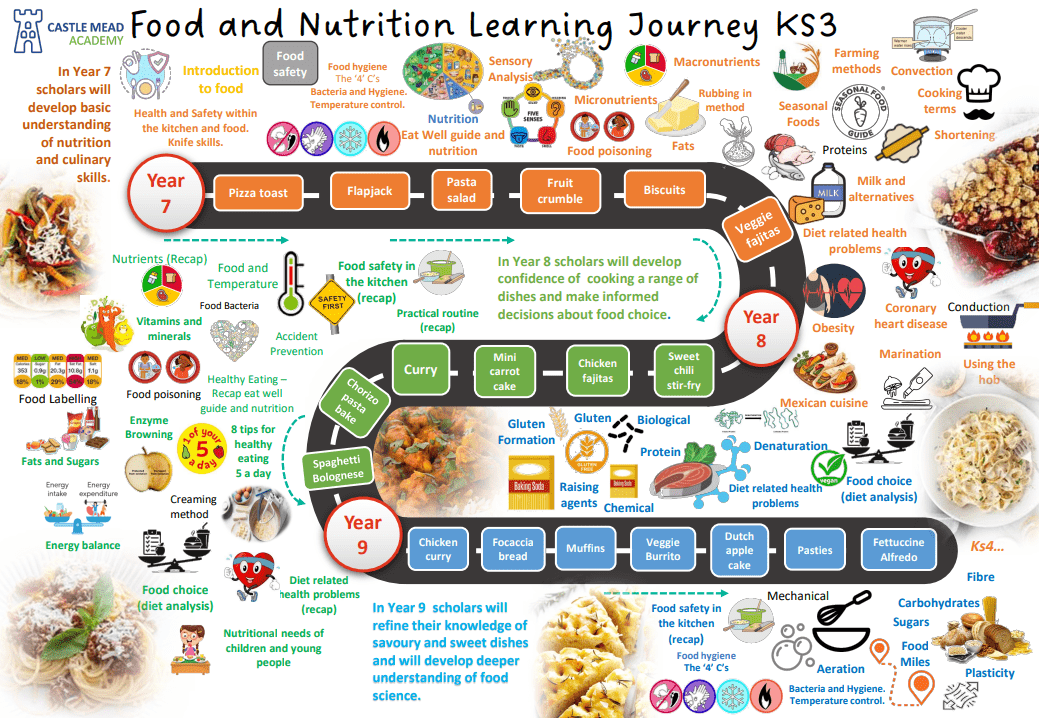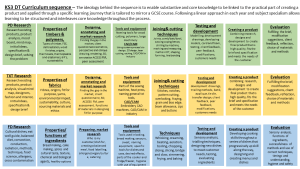What makes the DT curriculum so special?
The DT curriculum incorporates a range of life skills that are learnt through knowledge rich sessions delivered by experts in their field that is then applied to practical projects that scholars make in a 13 week rotation to create a successful product. The products link to everyday life skills and train and develop scholars to be ready for future life at college, apprenticeships and careers.
In food and nutrition, scholars learn about The Eat Well Guide and how to sustain a healthy lifestyle, learning all about nutrients, how the body works and the benefits of the different food groups to then creating a series of dishes such as fruit salads, cheese scones, chicken stir fry, lasagne and many more. As scholars grow through each year they delve into the world of cultural cuisine, creating curries, pasta dishes, bakery items, chilli con carne and falafels. They conduct science experiments to find out how yeast makes bread rise and the functions of different ingredients.
In product design, scholars follow a spiral curriculum that develops knowledge over the years of different materials. Scholars start by learning about timbers, joining methods, maths in DT, and have a basic introduction to the workshop in year 7, where they will create a ‘block bot’ made from pine. They then develop skills and knowledge handling polymers and CAD/CAM machines, which is the future of design. Year 9 includes building on handling timbers and polymers of a higher skill and learning how to solder electronics to create a mood lamp that has been designed in detail at a previous stage.
In textiles, scholars are trained to use a sewing machine and hand sew independently. From year 7 they learn basic skills to be able to design and create a pencil case, in year 8 a bag and year 9 a quilted book cover. Scholars learn the importance of working to a design brief and specification, focusing on the customers’ wants and needs. They develop work in a testing section that teaches scholars how to complete key textiles techniques such as batik, tie-dye, sewing zips, embroidery, embellishment, applique, seams, buttons and many more. They then apply this theory and testing practise to a final product which they are proud to take home.
How is the DT curriculum enacted in a way that honours its beauty, richness and distinctiveness?
Delivered by experts, our scholars receive tailored support to become masters in product design, food preparation and nutrition and textiles. Our experts facilitate extra-curricular and intervention events that inspire young people to become the future generation of designers. Bake offs, sewing bees, talks from careers and professionals in the field and visits from successful practitioners in these subjects really show our scholars what they can achieve.
Experts in each specialism deliver powerful knowledge sessions that equip and empower scholars to be able to apply this knowledge to a practical session. These are carefully planned to the detail and are based around core knowledge that can be applied to the handling of many different materials. Scholars can be inspired by the teachers own craft and feel secure in knowing that they are receiving expert teaching. Our curriculum is planned and continuously refined throughout the rotation system to ensure scholars are being equipped with purposeful knowledge that they can use not just at school but for future education and careers.
How does the DT curriculum equip scholars with knowledge that provides them with new ways of thinking about the world and has the capacity to take them beyond their own original experiences?
Scholars take pride and enjoyment from creating projects where they have learnt a range of skills. They develop a passion and enthusiasm for cooking, product design and textiles. From creating savoury and sweet dishes and looking into culture and diversity in the kitchen, to working with timbers and plastics to create new and innovative products, learning about the origins of textiles products and the process that create out everyday furnishings, clothes and much more. This curriculum seeks to enable the younger generation to become designers of the future.
How does the DT curriculum reflect intelligent interdisciplinarity, to allow scholars to explore meaningful connections?
We focus on the substantive knowledge and powerful theory that drives our subjects to create the successful high-quality outcomes. Following a road map or research, development, design work and creating a product our curriculum seeks to teach scholars the why behind the making. Our curriculum links through other STEM subjects as we focus on experiments in food preparation and nutrition and links through Maths and engineering in DT.
Subject Leader/s
Mrs G Sharpe
[email protected]




